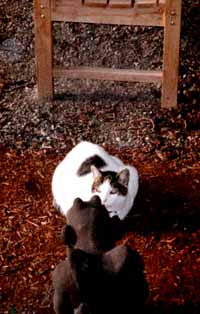Order Jamie's books online with Paypal or a credit card

|
Vol 14|No 3|February|2018
|
|
Stupid Questions
by Jamie McKenzie (about author)
“How many gargoyles are there on the Cathedral of Notre Dame in Paris?”
|
 Photo © J.McKenzie Photo © J.McKenzie |
It is considered axiomatic that “there is no such thing as a stupid question,” but the truth is quite different.
Some questions really are stupid because they distract, divert and delay the important thinking work that should be done. They are time wasters. They bog one down in trivial pursuit. They are not worthy of our attention.
The axiom is meant to encourage the hesitant explorer to share whatever questions come to mind — not to be afraid of ridicule when confessing confusion or a lack of understanding — but it should not grant license to indulge in thinking that takes one down wasteful avenues and byways. It may be ok to pose stupid questions if they are quickly labelled and set aside so the explorer may pursue more meaningful questions, but to ignore or deny their stupidity is folly.
Some questions embedded in curriculum or posed by teachers are quite stupid and stultifying. Others emerge from students and thinkers as they consider an issue, a problem or a challenge. While we should approach inquiry with an open mind, entertaining all questions that seem pertinent, we must also be discerning, devoting the majority of our effort to questions that will lead us toward understanding and insight.
 Photo © J.McKenzie Photo © J.McKenzie
The Gargoyle Question - a Prime Example
Sometimes we ask students to pursue answers to questions that are not worthy of much effort or attention.
"How many gargoyles are there on the Cathedral of Notre Dame?"
Who really cares?
The eleventh grade student sent me an e-mail message. "Can you help me?"
The teacher had a set of extra credit questions. Tough questions. But why would anyone need to know how many gargoyles perch upon the ramparts of the Cathedral of Notre Dame de Paris?
There are so many more important and more intriguing questions we could explore about gargoyles. When we limit students to trivial pursuit, we make a mockery of authentic research and deprive them of a chance to explore the tough issues, choices, dilemmas and questions that really matter.
- Why did people place gargoyles on cathedrals?
- What good are gargoyles?
- How are gargoyles (gargouilles) and chimeras (chimeres) different and which are better?
- Why do some people place gargoyles in their gardens?
  Photo © J.McKenzie Photo © J.McKenzie
- Why does this cat sit with the gargoyle?
- Why does the gargoyle sit with the cat?
- Why do some people place gargoyles on their desks?
- Why do some people place gargoyles on their office buildings?
- What kinds of people like gargoyles? Why?
- Are some gargoyles better than others?
- What are the traits or characteristics of a good gargoyles? Should they be fierce and threatening? Kind, gentle and welcoming?
- How should modern gargoyles be different from the ancient ones? Why?
- Which of the gargoyles below would make the best one for your house or garden? Why? Click on an image to see larger version.
 Gargoyle 1
Gargoyle 1
|

Gargoyle 2
|

Gargoyle 3
|

Gargoyle 4
|

Gargoyle 5
|
- Do we still need gargoyles? Why?
- Will we always need gargoyles? Why?
- How do other cultures like Bali islanders and Hindus make use of figures carved in wood or stone?
- In what ways are such figures or gargoyles like icons?
- How do icons influence the quality of life and our culture? Are they healthy? Unhealthy?
- Why do some celebrities become icons? Are some celebrities like gargoyles?
Some call such questions essential questions or questions of import because they call upon our best thinking and touch upon those matters that define what it means to be human. They are questions that help us to make meaning out of the events and circumstances of our lives.
There is a huge difference between knowledge on the one hand and understanding or insight on the other hand.
Schools often engage students in collecting answers, in accumulating information. But essential questions require that students spend time pondering the meaning and importance of information.
Essential questions are questions that resonate within our hearts and our souls. They are central to our lives. Most important thought during our lives will center on such essential questions.
It turns out the "How many gargoyles?" question is not only stupid, it is probably unanswerable, as an email from the Office de Tourisme et des Congres de Paris stated the following:
"We are still waiting and looking for new elements. We were also told by Mr. Fonquernie's assistant that the number of gargoyles is not same than when the Cathedral Notre-Dame was built : some broke, there were destructions, some gargoyles were added later . . ."
Note: Portions of the above text appeared first in the article, "From Trivial Pursuit to Essential Questions and Standards-Based Learning."
 Photo © J.McKenzie Photo © J.McKenzie
And then we have The Great Wall of China
At a time when the American President and Congress are arguing about the value of building a wall along the border with Mexico, the time is ripe for thoughtful exploration of walls and what they can do (or not do) for neighbors.
Sadly, many students are burdened with the mere collection of facts instead of exploring the intriguing issues and questions suggested by such wall building.
- How long is the Great Wall of China?
- What did each of the following dynasties contribute to the building of the Wall: Qin, Han, and Ming?
- Who were the important emperors during each dynasty: Qin, Han, and Ming?
- What did the important emperors during each dynasty accomplish: Qin, Han, and Ming?
 Photo © J.McKenzie Photo © J.McKenzie
There are so many more intriguing and important questions to ask about The Great Wall and walls, in general — questions that will resonate with current events and seem relevant to the students' times.
 Photo © J.McKenzie Photo © J.McKenzie |
- Did the Great Wall do any good?
- How much did it really cost? (literal meaning vs. other meanings)
- Who paid the price? Was it worth it?
- Why do we build walls?
- Who builds walls?
- When are walls a good idea?
- How does Robert Frost's poem "Mending Wall" relate to the Great Wall of China?
- What other poems and songs can you find that help us to think about the Great Wall of China as well as other walls in history like The Berlin Wall and the wall proposed by President Trump?
- How has your study of the Great Wall shaped your feelings and thinking about the wall proposed by the Trump Administration? To what extent do you agree or disagree with the proposal and why?
|
The Importance of Surprise
There should be surprise, delight or even discomfort as one explores.
True inquiry involves discovery. The task at hand should awaken curiosity and take the student on an adventure. Mere topical research requires little more than gathering and is often sleep inducing. It is up to the teacher to frame research projects around questions of import and tasks that require fresh thinking, problem-solving and imagination.
Questions that ask who did what are time-wasters, dull and not worthy of students' time. Mere gathering and cut-and-pasting is unacceptable. Such questions are simply stupid.
The following checklist was designed to help teachers determine whether their research assignments are likely to produce surprise, awaken curiosity and challenge students at the highest possible levels. While some will seem self evident, each is explained at greater length below the checklist. Simply click on the  to read the full explanation. to read the full explanation.
Note: The above table first appeared in the article "The importance of surprise when conducting authentic research"
The Wrong Question at the Wrong Time
Some questions bog the investigator down in research that is tangential and not productive. They may seem smart at the time, but they are actually quite harmful and stupid. It is a bit like Nancy Drew wasting all her time on one suspect while ignoring the real culprit.
This happens often to problem-solving teams that devote insufficient attention to "problem identification" — a phase that involves finding the true issue as opposed to shooting from the hip at symptoms rather than dealing with root causes.
"How do we punish students for plagiarism?" is a prime example.
The real question should be "How do we prevent plagiarism?" A meaningful response requires a thorough review of root causes along with strategies that might encourage students to avoid such dishonesty.
Jumping to conclusions is a chronic problem for groups, one that bogs them down in exploring questions and action plans that are unlikely to produce lasting or satisfying results.
|
The Great Report
|
 |
You can read sample chapters and see the list of chapters by clicking here.
Order the print version by clicking below.
Order through the mail with a check, click here for the order form.
|
 Photo © J.McKenzie
Photo © J.McKenzie Photo © J.McKenzie
Photo © J.McKenzie

 Photo © J.McKenzie
Photo © J.McKenzie
 Photo © J.McKenzie
Photo © J.McKenzie
 Photo © J.McKenzie
Photo © J.McKenzie Photo © J.McKenzie
Photo © J.McKenzie![]() to read the full explanation.
to read the full explanation.





